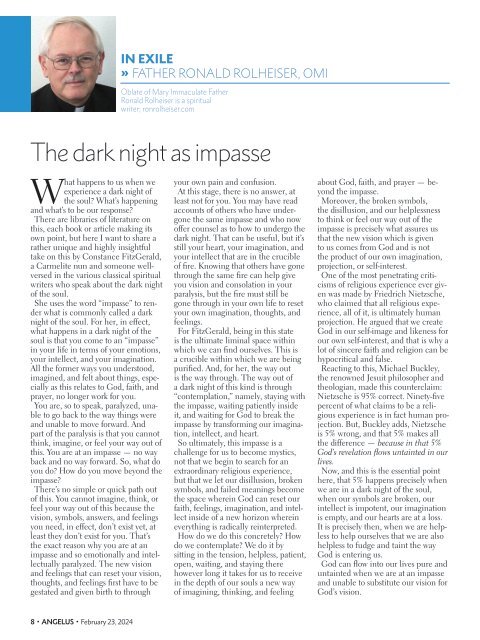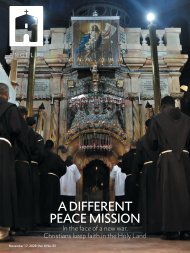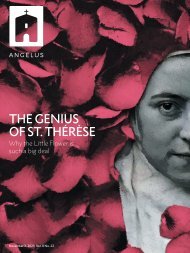Angelus News | February 23, 2024 | Vol. 9 No. 4
On the cover: A painting depicting Jesus in the Garden of Gethsemane by 19th-century artist Carl Heinrich Bloch. For Christians, Lent can be compared to the time Jesus spent praying in the desert. But we may also find ourselves this time of year in the agony of the garden, going through our own Gethsemane of personal suffering. On Page 10, Msgr. Richard Antall reflects on two traditional prayers to the same angel that comforted Christ on the Mount of Olives.
On the cover: A painting depicting Jesus in the Garden of Gethsemane by 19th-century artist Carl Heinrich Bloch. For Christians, Lent can be compared to the time Jesus spent praying in the desert. But we may also find ourselves this time of year in the agony of the garden, going through our own Gethsemane of personal suffering. On Page 10, Msgr. Richard Antall reflects on two traditional prayers to the same angel that comforted Christ on the Mount of Olives.
You also want an ePaper? Increase the reach of your titles
YUMPU automatically turns print PDFs into web optimized ePapers that Google loves.
IN EXILE<br />
FATHER RONALD ROLHEISER, OMI<br />
Oblate of Mary Immaculate Father<br />
Ronald Rolheiser is a spiritual<br />
writer; ronrolheiser.com<br />
The dark night as impasse<br />
What happens to us when we<br />
experience a dark night of<br />
the soul? What’s happening<br />
and what’s to be our response?<br />
There are libraries of literature on<br />
this, each book or article making its<br />
own point, but here I want to share a<br />
rather unique and highly insightful<br />
take on this by Constance FitzGerald,<br />
a Carmelite nun and someone wellversed<br />
in the various classical spiritual<br />
writers who speak about the dark night<br />
of the soul.<br />
She uses the word “impasse” to render<br />
what is commonly called a dark<br />
night of the soul. For her, in effect,<br />
what happens in a dark night of the<br />
soul is that you come to an “impasse”<br />
in your life in terms of your emotions,<br />
your intellect, and your imagination.<br />
All the former ways you understood,<br />
imagined, and felt about things, especially<br />
as this relates to God, faith, and<br />
prayer, no longer work for you.<br />
You are, so to speak, paralyzed, unable<br />
to go back to the way things were<br />
and unable to move forward. And<br />
part of the paralysis is that you cannot<br />
think, imagine, or feel your way out of<br />
this. You are at an impasse — no way<br />
back and no way forward. So, what do<br />
you do? How do you move beyond the<br />
impasse?<br />
There’s no simple or quick path out<br />
of this. You cannot imagine, think, or<br />
feel your way out of this because the<br />
vision, symbols, answers, and feelings<br />
you need, in effect, don’t exist yet, at<br />
least they don’t exist for you. That’s<br />
the exact reason why you are at an<br />
impasse and so emotionally and intellectually<br />
paralyzed. The new vision<br />
and feelings that can reset your vision,<br />
thoughts, and feelings first have to be<br />
gestated and given birth to through<br />
your own pain and confusion.<br />
At this stage, there is no answer, at<br />
least not for you. You may have read<br />
accounts of others who have undergone<br />
the same impasse and who now<br />
offer counsel as to how to undergo the<br />
dark night. That can be useful, but it’s<br />
still your heart, your imagination, and<br />
your intellect that are in the crucible<br />
of fire. Knowing that others have gone<br />
through the same fire can help give<br />
you vision and consolation in your<br />
paralysis, but the fire must still be<br />
gone through in your own life to reset<br />
your own imagination, thoughts, and<br />
feelings.<br />
For FitzGerald, being in this state<br />
is the ultimate liminal space within<br />
which we can find ourselves. This is<br />
a crucible within which we are being<br />
purified. And, for her, the way out<br />
is the way through. The way out of<br />
a dark night of this kind is through<br />
“contemplation,” namely, staying with<br />
the impasse, waiting patiently inside<br />
it, and waiting for God to break the<br />
impasse by transforming our imagination,<br />
intellect, and heart.<br />
So ultimately, this impasse is a<br />
challenge for us to become mystics,<br />
not that we begin to search for an<br />
extraordinary religious experience,<br />
but that we let our disillusion, broken<br />
symbols, and failed meanings become<br />
the space wherein God can reset our<br />
faith, feelings, imagination, and intellect<br />
inside of a new horizon wherein<br />
everything is radically reinterpreted.<br />
How do we do this concretely? How<br />
do we contemplate? We do it by<br />
sitting in the tension, helpless, patient,<br />
open, waiting, and staying there<br />
however long it takes for us to receive<br />
in the depth of our souls a new way<br />
of imagining, thinking, and feeling<br />
about God, faith, and prayer — beyond<br />
the impasse.<br />
Moreover, the broken symbols,<br />
the disillusion, and our helplessness<br />
to think or feel our way out of the<br />
impasse is precisely what assures us<br />
that the new vision which is given<br />
to us comes from God and is not<br />
the product of our own imagination,<br />
projection, or self-interest.<br />
One of the most penetrating criticisms<br />
of religious experience ever given<br />
was made by Friedrich Nietzsche,<br />
who claimed that all religious experience,<br />
all of it, is ultimately human<br />
projection. He argued that we create<br />
God in our self-image and likeness for<br />
our own self-interest, and that is why a<br />
lot of sincere faith and religion can be<br />
hypocritical and false.<br />
Reacting to this, Michael Buckley,<br />
the renowned Jesuit philosopher and<br />
theologian, made this counterclaim:<br />
Nietzsche is 95% correct. Ninety-five<br />
percent of what claims to be a religious<br />
experience is in fact human projection.<br />
But, Buckley adds, Nietzsche<br />
is 5% wrong, and that 5% makes all<br />
the difference — because in that 5%<br />
God’s revelation flows untainted in our<br />
lives.<br />
<strong>No</strong>w, and this is the essential point<br />
here, that 5% happens precisely when<br />
we are in a dark night of the soul,<br />
when our symbols are broken, our<br />
intellect is impotent, our imagination<br />
is empty, and our hearts are at a loss.<br />
It is precisely then, when we are helpless<br />
to help ourselves that we are also<br />
helpless to fudge and taint the way<br />
God is entering us.<br />
God can flow into our lives pure and<br />
untainted when we are at an impasse<br />
and unable to substitute our vision for<br />
God’s vision.<br />
8 • ANGELUS • <strong>February</strong> <strong>23</strong>, <strong>2024</strong>

















